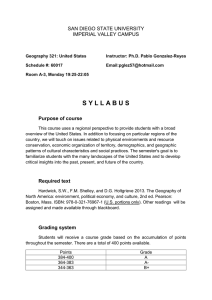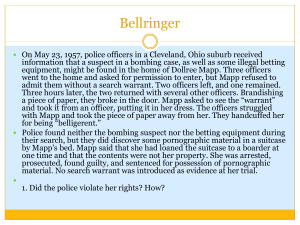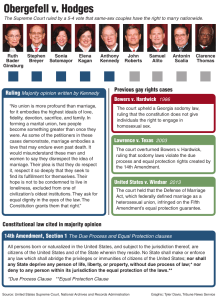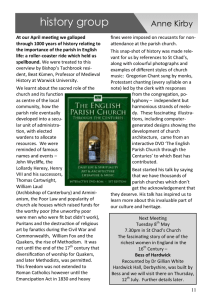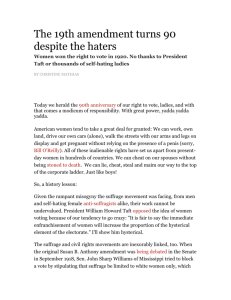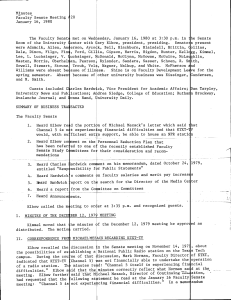Winter/Spring 2009 CROUCH - PROPERTY Page 1 of 15
advertisement
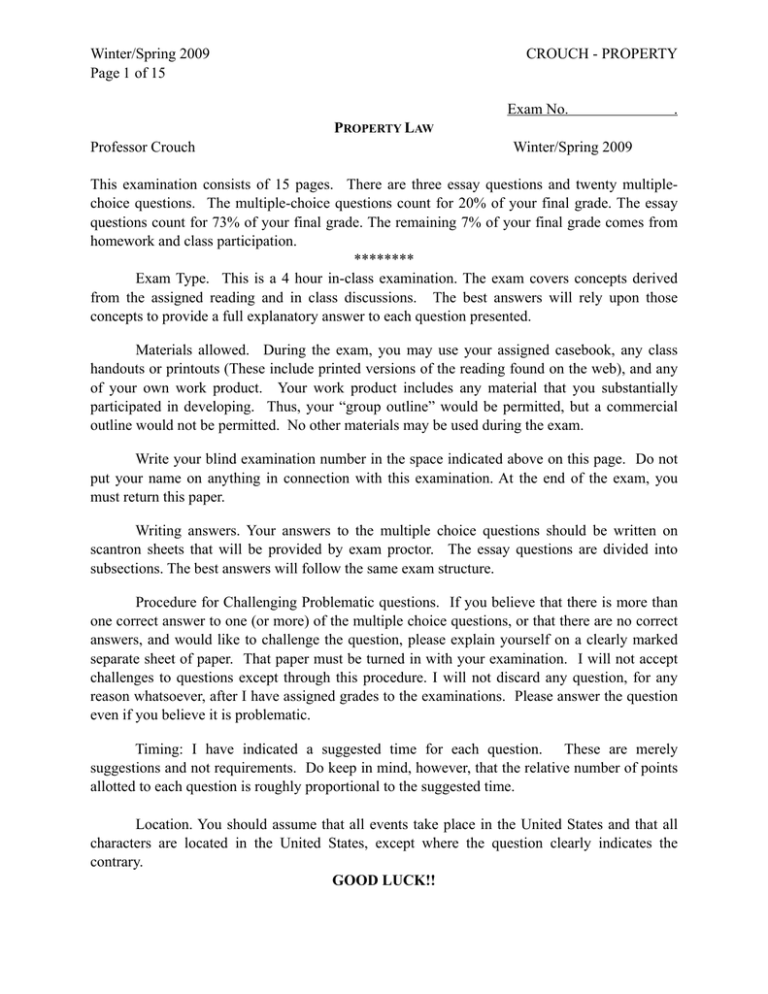
Winter/Spring 2009 Page 1 of 15 CROUCH - PROPERTY Exam No. . PROPERTY LAW Professor Crouch Winter/Spring 2009 This examination consists of 15 pages. There are three essay questions and twenty multiplechoice questions. The multiple-choice questions count for 20% of your final grade. The essay questions count for 73% of your final grade. The remaining 7% of your final grade comes from homework and class participation. ******** Exam Type. This is a 4 hour in-class examination. The exam covers concepts derived from the assigned reading and in class discussions. The best answers will rely upon those concepts to provide a full explanatory answer to each question presented. Materials allowed. During the exam, you may use your assigned casebook, any class handouts or printouts (These include printed versions of the reading found on the web), and any of your own work product. Your work product includes any material that you substantially participated in developing. Thus, your “group outline” would be permitted, but a commercial outline would not be permitted. No other materials may be used during the exam. Write your blind examination number in the space indicated above on this page. Do not put your name on anything in connection with this examination. At the end of the exam, you must return this paper. Writing answers. Your answers to the multiple choice questions should be written on scantron sheets that will be provided by exam proctor. The essay questions are divided into subsections. The best answers will follow the same exam structure. Procedure for Challenging Problematic questions. If you believe that there is more than one correct answer to one (or more) of the multiple choice questions, or that there are no correct answers, and would like to challenge the question, please explain yourself on a clearly marked separate sheet of paper. That paper must be turned in with your examination. I will not accept challenges to questions except through this procedure. I will not discard any question, for any reason whatsoever, after I have assigned grades to the examinations. Please answer the question even if you believe it is problematic. Timing: I have indicated a suggested time for each question. These are merely suggestions and not requirements. Do keep in mind, however, that the relative number of points allotted to each question is roughly proportional to the suggested time. Location. You should assume that all events take place in the United States and that all characters are located in the United States, except where the question clearly indicates the contrary. GOOD LUCK!! Winter/Spring 2009 Page 2 of 15 CROUCH - PROPERTY Essay 1 (Suggested time: 110 minutes) After graduating from Law School, HARDWICK headed to Southwestern Missouri to start his solo law practice in the town of Monett. To save money, HARDWICK worked from his home-office. Wanting to appear professional, he came to an agreement with another local attorney (SCOTT). According to the written agreement, HARDWICK was granted a right to use SCOTT’s conference room and copy-machine facilities for up to 8 hours per week and HARDWICK could use SCOTT’s office as a mailing address. The agreement had a stated term of two years with a required monthly payment and states that HARDWICK may not sub-contract his rights to the property. a. After a few months, HARDWICK became frustrated because the copier was often brokendown. HARDWICK complained to no avail. Eventually, HARDWICK assigned all his interests in the agreement to CHUKWU who mutually agreed with HARDWICK to continue to pay the required monthly installments to SCOTT. (SCOTT was not asked his for his opinion or permission for the transfer.) HARDWICK had not told CHUKWU of the copier problem. She was so frustrated by the problem that after one month she stopped paying rent and mailed the keys to SCOTT. Can HARDWICK properly claim that his agreement with SCOTT was a lease? Who is liable in the end? Would it matter if all the parties were attorneys? b. HARDWICK decides to purchase land for an office from COLE - AKA “Trump of Monett.” The land that HARDWICK purchases is not landlocked, but COLE agrees to an easement for ingress and egress over the FRONT portion of COLE’s property so that HARDWICK would have direct access to Main street. At the time that HARDWICK purchased the estate, SHAW had been squatting on the FRONT portion of the estate for five years - living in a camouflaged building with a storehouse of weapons. To be clear, SHAW was not on the HARDWICK portion, however, he had constructed fences around the FRONT estate and - if need be - would have blocked HARDWICK from using the easement. As it turned out, HARDWICK never used his estate, and after six year, he sold a life estate to ADAMS (including the easement). HARDWICK’s Will includes a statement that - upon his death - all his property should pass to his last-born daughter. HARDWICK is still alive and is without issue. Shortly after ADAMS purchased the property, SHAW filed to quiet title - claiming adverse possession. Before receiving notice of the lawsuit, COLE had never heard of SHAW. Sort out who owns what and whether there is any residual liability. Winter/Spring 2009 Page 3 of 15 CROUCH - PROPERTY c. Meanwhile, HARDWICK was having some trouble on the home-front. He and ROGERS had jointly purchased a home in a swank subdivision in Monett. Two years after they moved-in, 90% of the homeowners voted in favor of an amendment to the covenant that bound all homes in the subdivision. The amendment (1) raised the assessment fees from $15 per month to $800 per month to pay for development of a women-only gymnasium and (2) specifically prohibited the use of homes for “home offices.” ROGERS was indifferent, but HARDWICK vehemently opposed the proposals. After the changes became effective, HARDWICK refused to pay the increased fees and continued to operate his home office. The homeowners association recently filed-suit for damages and injunctive relief against ROGERS and HARDWICK. How would you advise ROGERS in this situation as to his rights and obligations? Would it be different if HARDWICK and ROGERS owned as tenants by the entirety? Winter/Spring 2009 Page 4 of 15 CROUCH - PROPERTY Essay 2 (Suggested time: 50 minutes) LITTON collects bobble-head dolls. As a birthday gift to his 12 year old son ROCKY, LITTON wrote-up a document purporting to “hereby give a fee simple future interest in my bobble-head doll collection to my son ROCKY that will become possessory upon my death.” LITTON executed and delivered the paper, but the gift was a disaster because LITTON would not let ROCKY actually touch any of the dolls. Both father and son felt dejected. In a subsequent e-mail to his son (their primary method of communication) LITTON “revoke[d] the gift.” After a trip online to eBay, ROCKY began to have some remorse -- he calculated the value of the collection at more than $5,000! Wanting quick money, ROCKY then sold his future interest to a local collector for $800. Meanwhile, LITTON grew tired of bobble dolls. He sold some to a collector in California, and gave others to law students. Five were stolen in a robbery of LITTON’s home and then re-sold on eBay to XANDER. After that, LITTON hid the remaining dolls in a secret compartment in his minivan. LITTON eventually died, leaving all his belongings to is daughter OPHELIA who quickly sold the van to BARONDES to be re-fitted as a K-series van racer. Although LITTON did not specifically mention the dolls in his WILL, OPHELIA did find a GPS Tracer in LITTON’s office that could be used to identify the physical location of each doll. Who owns the dolls? Does your answer change if ROCKY had properly recorded his future interest in the dolls? Would your answer change if LITTON had never attempted to “rescind” his gift? Could ROCKY have prevented LITTON from selling the dolls during LITTON’s lifetime? Essay 3 (Suggested time: 30 minutes) These days, it can be difficult to obtain injunctive relief in a property case. Brown v. Voss is a case in point. There, the court found that an easement was being improperly used, refused to award any relief. This is a far cry from Blackstone’s description of a property rights holder having “sole despotic dominion.” Brown could be compared with the Steenberg Homes decision where $100,000 in punitive damages were awarded even though no actual damages were found. Does this shift toward weaker protection of individual property rights make sense in our increasingly urban society? End of Essay Section Winter/Spring 2009 Page 5 of 15 CROUCH - PROPERTY Multiple Choice -- Please Select Only The Best Answer for Each Question 20 Questions (Suggested Time 50 minutes) The multiple choice questions have not been published.

